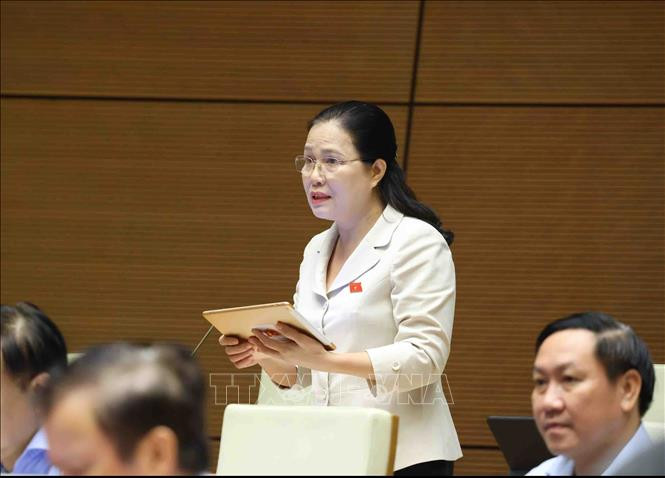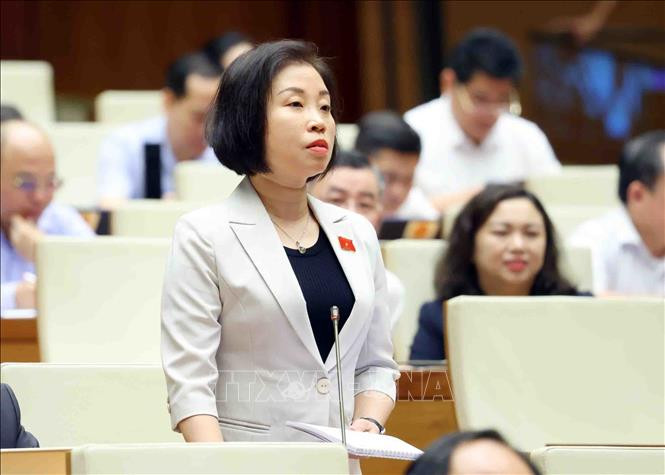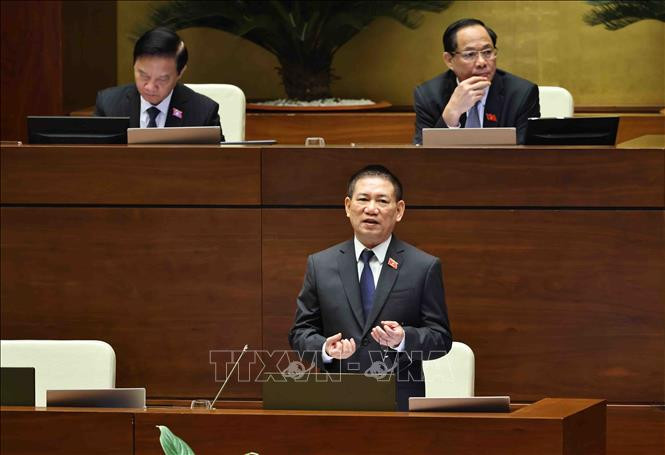On the morning of June 7, the National Assembly discussed in the hall about "Approving the 2022 state budget settlement".

At the hall, through the 2022 settlement data, delegates highly appreciated the Government's management work when all three very important indicators of 2022 were achieved and exceeded. The increase in state budget revenue in 2022 was very high, creating resources to focus on investing in the construction of key projects, especially highways, inter-regional routes, and key national and local projects. In addition, in 2022, the actual expenditure was lower than the estimate. The budget deficit was also very economical, lower than the target assigned by the National Assembly...
Delegates also raised many issues about the large amount of funds transferred to next year; the debt in basic construction is not showing a decreasing trend;...
At the meeting, delegate Do Thi Lan (Quang Ninh) cited reported data showing that some budget expenditures were lower than the estimate; the disbursement rate of investment capital of some ministries, branches and localities was lower than the assigned capital plan. The amount transferred to the following year was very large; the final settlement of state budget expenditure in 2022 was 86.7% of the estimate. Development investment expenditure reached over 71%, regular expenditure did not meet the estimate, the amount transferred from 2022 to 2023 was very large and increased significantly compared to 2021. Regular expenditure for education, training and vocational training only reached 56.9% of the estimate; expenditure for health care and family only reached over 43%...
Delegate Do Thi Lan affirmed that the central budget expenditure task at the local level has a very large demand but the budget cannot be arranged to implement it, while the budget estimate must be canceled. Typically, the implementation of the capital investment plan for the national target program only reached 37.7% of the estimate, with some localities achieving less than 10%. Implementing the capital plan for the Socio-Economic Recovery and Development Program according to Resolution No. 43/2022/QH15, some policies have low disbursement rates, especially the investment policy for health and labor development, which must be transferred to 2023 and 2024.
"This shows that the use of the State budget in some places is ineffective and wasteful, resources allocated for many contents cannot be implemented, while there is still a lot of investment demand, having to borrow and pay interest to compensate for budget deficit" - delegate Lan said, at the same time suggesting that the shortcomings in the work of preparing and implementing the State budget estimate should be included in the Resolution of the National Assembly, and solutions should be found to overcome them.
The delegates analyzed the causes of the above shortcomings and limitations mainly due to the fact that the budget expenditure estimates are not close to reality, the work of making, appraising, approving the budget estimates, preparing investment estimates, making capital plans, and allocating capital is slow. The issuance of detailed documents for the implementation of a number of socio-economic development policies and tasks still has many shortcomings; financial mechanisms and policies have many obstacles and are slow to be amended; the organization and implementation work in some places is still stagnant, there is still a situation where officials are afraid of making mistakes, afraid of responsibility, and are not determined to implement effectively. Therefore, the delegates suggested that the shortcomings in the work of making and implementing the state budget estimates should be included in the National Assembly's Resolution on approving the 2022 state budget settlement; and there should be solutions to overcome them.

Meanwhile, delegate Pham Thi Thanh Mai (Hanoi) said that it is necessary to make a comprehensive assessment of the basic construction debt picture, which has not shown a downward trend and has re-emerged. "We not only have basic construction debt from January 1, 2015 and earlier, but the Investment Law has strictly prohibited it because it is a violation. In the Prime Minister's Directives as well as the National Assembly's Resolutions, especially Resolution 91 of 2023 on approving the State budget settlement, the Government is required to carefully review and ensure a full, comprehensive, and true assessment of the basic construction debt situation."
In 2022 alone, the State Audit report showed that more than VND4,000 billion in basic construction debt was discovered. Delegate Pham Thi Thanh Mai emphasized that if we do not thoroughly address this issue, new debt will continue to arise. Therefore, the delegate believes that it is necessary to minimize the impact on enterprises that use public investment capital honestly and entrust their trust in implementing public investment projects, borrowing from banks, and then promptly paying when the volume is completed.
At the same time, the delegate assessed that the Ministry of Finance and the State Treasury have recently promoted the completion of the volumes. However, delegate Pham Thi Thanh Mai realized that the responsibility of investors has not really been involved with contractors to remove difficulties or speed up this work. This is the responsibility of the Government agencies that are still lacking in determination and still being considerate in the issue of capital allocation in basic construction debt and public investment.
Through monitoring with the Finance and Budget Committee, not all items are the responsibility of the locality, some are the responsibility of the Central Government. Therefore, delegate Pham Thi Thanh Mai requested the Government to clearly report this content to the National Assembly, otherwise this situation will continue to recur.

Explaining at the meeting, Minister of Finance Ho Duc Phoc said that regarding the large source transfer expenditure from 2022 to 2023, of which the source for salary reform accounts for 37.7%, equivalent to 432,000 billion; development investment expenditure is over 300,000 billion, accounting for 27% of the source transfer...
"Thus, the high transfer cost is mainly due to the resources transferred according to legal regulations, especially the accumulated resources over the years to implement salary reform, which plays a big role. In addition, tasks that have been signed contracts and implemented in the year but have not been paid will be transferred to the following year according to legal regulations. Regarding the transfer of resources, the Ministry of Finance, ministries, branches and localities need to try to make payments within the year, so that the number of transfers is reduced," the Minister emphasized.
Regarding capital construction debt, according to the Minister of Finance, the debt at the central level is very small, but at the local level is large. Because when arranging the medium-term public investment plan, the arrangement is flawed or not arranged at all. Then there are projects with investment procedures that have shortcomings, need to adjust the total investment, the local budget does not arrange in time... Investors and localities need to review to pay enterprises.
Regarding budget expenditures for localities, according to the provisions of the State Budget Law, the central budget only undertakes the expenditure tasks of the central budget. For national highways managed by the Ministry of Transport, the repair, maintenance and upkeep costs are allocated by the Ministry of Finance to the Ministry of Transport. For routes that the Ministry of Transport has delegated to the provinces, the Ministry of Finance will reallocate them to the provinces for repair, and for routes that are under the expenditure tasks of the Ministry of Transport, the Ministry of Finance will transfer the source to the Ministry of Transport for control and expenditure.